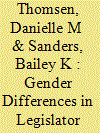| Srl | Item |
| 1 |
ID:
193659


|
|
|
|
|
| Summary/Abstract |
Competition among candidates or parties is a necessary condition for democracy. But who counts as a candidate and what counts as competition? The influence of money in American elections makes fundraising an appropriate alternative to vote totals, and it provides a new vantage point to assess the quality of electoral competition. I draw on a dataset of preelection campaign receipts to measure competition in U.S. House primaries from 1980 to 2020. When competition is measured with receipts, it looks markedly worse than vote share measures suggest. Moreover, the difference between vote share and fundraising measures is largest in open-seat primaries, or the best-case scenarios of competition. The disparity between measures is driven largely by candidates who have little chance of winning. The findings shed new light on resource disparities in elections and demonstrate that our conclusions about the quality of competition are tied to our measures.
|
|
|
|
|
|
|
|
|
|
|
|
|
|
|
|
| 2 |
ID:
175829


|
|
|
|
|
| Summary/Abstract |
A growing body of research shows that women legislators outperform their male counterparts in the legislative arena, but scholars have yet to examine whether this pattern emerges in non-policy aspects of representation. We conducted an audit study of 6,000 U.S. state legislators to analyze whether women outperform or underperform men on constituency service in light of the extra effort they spend on policy. We find that women are more likely to respond to constituent requests than men, even after accounting for their heightened level of policy activity. Female legislators are the most responsive in conservative districts, where women may see the barriers to their election as especially high. We then demonstrate that our findings are not a function of staff responsiveness, legislator ideology, or responsiveness to female constituents or gender issues. The results provide additional evidence that women perform better than their male counterparts across a range of representational activities.
|
|
|
|
|
|
|
|
|
|
|
|
|
|
|
|
| 3 |
ID:
175274


|
|
|
|
|
| Summary/Abstract |
The leading explanation for the underrepresentation of women in American politics is that women are less likely to run for office than men, but scholars have given less attention in recent years to the gender makeup of the pipeline to elected office. We examine the gendered pipeline to power across three potential candidate pools: lower-level officeholders, those named in newspapers as likely candidates, and lawyers who made political contributions. We find some evidence that women are less likely to seek elected office; however, the dearth of women in the pipeline plays a much greater role in the lack of women candidates. For the gender disparity in candidates to close, women have to be far more likely to run for office than men, particularly on the Republican side. Our results highlight the need to consider the gendered pipeline to power alongside rates of entry in studies of women’s underrepresentation.
|
|
|
|
|
|
|
|
|
|
|
|
|
|
|
|